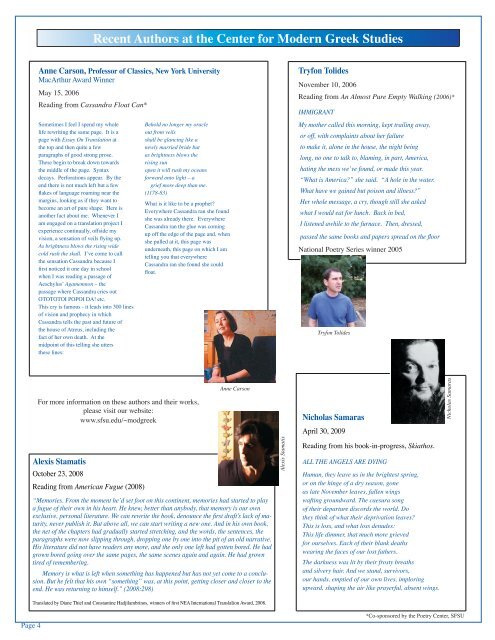mantatoforos - Center for Modern Greek Studies - San Francisco ...
mantatoforos - Center for Modern Greek Studies - San Francisco ...
mantatoforos - Center for Modern Greek Studies - San Francisco ...
Create successful ePaper yourself
Turn your PDF publications into a flip-book with our unique Google optimized e-Paper software.
Page 4<br />
Recent Authors at the <strong>Center</strong> <strong>for</strong> <strong>Modern</strong> <strong>Greek</strong> <strong>Studies</strong><br />
Anne Carson, Professor of Classics, New York University<br />
MacArthur Award Winner<br />
May 15, 2006<br />
Reading from Cassandra Float Can*<br />
Sometimes I feel I spend my whole<br />
life rewriting the same page. It is a<br />
page with Essay On Translation at<br />
the top and then quite a few<br />
paragraphs of good strong prose.<br />
These begin to break down towards<br />
the middle of the page. Syntax<br />
decays. Per<strong>for</strong>ations appear. By the<br />
end there is not much left but a few<br />
flakes of language roaming near the<br />
margins, looking as if they want to<br />
become an art of pure shape. Here is<br />
another fact about me. Whenever I<br />
am engaged on a translation project I<br />
experience continually, offside my<br />
vision, a sensation of veils flying up.<br />
As brightness blows the rising wide<br />
cold rush the skull. Iʼve come to call<br />
the sensation Cassandra because I<br />
first noticed it one day in school<br />
when I was reading a passage of<br />
Aeschylusʼ Agamemnon – the<br />
passage where Cassandra cries out<br />
OTOTOTOI POPOI DA! etc.<br />
This cry is famous - it leads into 300 lines<br />
of vision and prophecy in which<br />
Cassandra tells the past and future of<br />
the house of Atreus, including the<br />
fact of her own death. At the<br />
midpoint of this telling she utters<br />
these lines:<br />
Alexis Stamatis<br />
October 23, 2008<br />
Reading from American Fugue (2008)<br />
Behold no longer my oracle<br />
out from veils<br />
shall be glancing like a<br />
newly married bride but<br />
as brightness blows the<br />
rising sun<br />
open it will rush my oceans<br />
<strong>for</strong>ward onto light – a<br />
grief more deep than me.<br />
(1178-83)<br />
What is it like to be a prophet?<br />
Everywhere Cassandra ran she found<br />
she was already there. Everywhere<br />
Cassandra ran the glue was coming<br />
up off the edge of the page and, when<br />
she pulled at it, this page was<br />
underneath, this page on which I am<br />
telling you that everywhere<br />
Cassandra ran she found she could<br />
float.<br />
For more in<strong>for</strong>mation on these authors and their works,<br />
please visit our website:<br />
www.sfsu.edu/~modgreek<br />
Anne Carson<br />
“Memories. From the moment heʼd set foot on this continent, memories had started to play<br />
a fugue of their own in his heart. He knew, better than anybody, that memory is our own<br />
exclusive, personal literature. We can rewrite the book, denounce the first draftʼs lack of maturity,<br />
never publish it. But above all, we can start writing a new one. And in his own book,<br />
the net of the chapters had gradually started stretching, and the words, the sentences, the<br />
paragraphs were now slipping through, dropping one by one into the pit of an old narrative.<br />
His literature did not have readers any more, and the only one left had gotten bored. He had<br />
grown bored going over the same pages, the same scenes again and again. He had grown<br />
tired of remembering.<br />
Memory is what is left when something has happened but has not yet come to a conclusion.<br />
But he felt that his own “something” was, at this point, getting closer and closer to the<br />
end. He was returning to himself.” (2008:298)<br />
Translated by Diane Thiel and Constantine Hadjilambrinos, winners of first NEA International Translation Award, 2008.<br />
Alexis Stamatis<br />
Tryfon Tolides<br />
November 10, 2006<br />
Reading from An Almost Pure Empty Walking (2006)*<br />
IMMIGRANT<br />
My mother called this morning, kept trailing away,<br />
or off, with complaints about her failure<br />
to make it, alone in the house, the night being<br />
long, no one to talk to, blaming, in part, America,<br />
hating the mess weʼve found, or made this year.<br />
“What is America?” she said. “A hole in the water.<br />
What have we gained but poison and illness?”<br />
Her whole message, a cry, though still she asked<br />
what I would eat <strong>for</strong> lunch. Back in bed,<br />
I listened awhile to the furnace. Then, dressed,<br />
passed the same books and papers spread on the floor<br />
National Poetry Series winner 2005<br />
Tryfon Tolides<br />
Nicholas Samaras<br />
April 30, 2009<br />
Reading from his book-in-progress, Skiathos.<br />
ALL THE ANGELS ARE DYING<br />
Human, they leave us in the brightest spring,<br />
or on the hinge of a dry season, gone<br />
as late November leaves, fallen wings<br />
wafting groundward. The caesura song<br />
of their departure discords the world. Do<br />
they think of what their deprivation leaves?<br />
This is loss, and what loss denudes:<br />
This life dimmer, that much more grieved<br />
<strong>for</strong> ourselves. Each of their blank deaths<br />
wearing the faces of our lost fathers.<br />
The darkness was lit by their frosty breaths<br />
and silvery hair. And we stand, survivors,<br />
our hands, emptied of our own lives, imploring<br />
upward, shaping the air like prayerful, absent wings.<br />
Nicholas Samaras<br />
*Co-sponsored by the Poetry <strong>Center</strong>, SFSU


